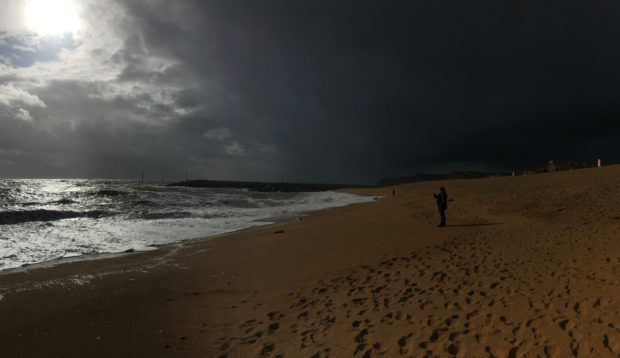When I was given the picture that hangs on my bedroom wall, I loved it instantly, not just for the swirling blues of its palette, but for the feelings it provoked in me.
It is very simple: a tumultuous sky in the distance, laden with swirling clouds above brooding hills and a choppy sea, the water covering every shade of blue from the colour of a midnight sky to the silvery blue of rain on a summer horizon.
Unwrapping it, I felt a sense of awe, partly because it was an enigma: an image that simultaneously captured power, chaos and fear; but also a kind of natural tranquility. I also loved it because of who gave it to me, but only when they described what they saw, did I realise this picture was something of a personality indicator, like the Rorschach inkblot test.
When I looked, I saw the swirling clouds on the horizon moving towards me: the storm was approaching. The slight swell in the dark water was only beginning and would rise to new heights as the onslaught approached. He, on the other hand, believed the storm in the distance was not approaching but passing. The clouds had been and gone, and far from swelling, the water was beginning to subside. Neither of us had even considered the other’s view.
One interpretation evoked apprehension, the other exhilaration. One might be considered optimistic, the other pessimistic. But the thing about our thoughts – and our personalities – is that they are not fixed. They change. They grow. In fact, psychological treatments, like Cognitive Behavioural Therapy, recognise that when we are stuck in a rut and thinking negatively about ourselves and our lives, we need to change our thoughts before we can change our behaviour.
As a sometimes negative thinker, the storm is always coming towards me. Recently, like many people, I have struggled in the downward emotional spiral that incarceration brings. My loved ones will get the virus. There’s the smoker with chest problems. And the one who lives alone who will struggle with isolation and I will be unable to help because of restrictions. Then there’s me. The smoker, the loner, the fantasy problem maker….
It doesn’t need to be that way. For these are just thoughts, not facts. The mind can be our greatest friend or most formidable enemy, and we have some control over which it is. “Listen,” said my living-alone loved one, “I am in my lovely little house, with good food, endless technology, the ability to Facetime you whenever I want…how hard can it be? Last century, people were asked to go to war. We’re being asked to sit on our sofas….”
We can see this time when our liberty is curtailed as a time of deprivation, or a time of recuperation and regrowth. We have the choice. All the things that we say we would love to do if only we had the time – well, now we have the time. No excuses. The time for books we want to read. Or write. For films we want to watch. For rooms we want to decorate. For cupboards we want to clear. For exercise equipment we want to use. And just as important…the time to get off the treadmill and do nothing. For action will follow rest.
And action in our world when this storm passes is surely needed. Recently, we have had reports of the first cases of Covid-19 in Syria where, according to the World Health Organisation, the “fragile health systems may not have the capacity to detect and respond,”; and also on the Greek island of Lesbos, where the Moria refugee camp holds around 20,000 people, many without tents or shelter, in desperate, unsanitary conditions. Moria is a human hell hole of infection and violence and most contagious of all, despair.
Coronavirus sweeping through Syria or Lesbos would prompt disaster of biblical proportions. While Europe rightly agonises over the shortage of ventilators and intensive care beds, such items are unthinkable luxury in a makeshift camp. We have no choice but to combat coronavirus as aggressively as we can. But it is interesting that this crisis has prompted unprecedented actions: the lockdowns; the restrictions we didn’t know were possible; the spending of billions of pounds that in austerity, we were told simply didn’t exist. Until suddenly they did.
Maybe this current storm can leave new thoughts and new behaviour in its wake. If coronavirus has forced the unthinkable, maybe when it’s all over we will have learned to be more proactive in the face of human tragedy, to understand that sometimes, the impossible is possible after all.
Changing thoughts can change actions on things that so often we have simply shrugged and accepted: on refugees; on climate change; on the homeless; on those who die on our doorstep every year because of disease and deprivation and fuel poverty. “We can’t…,”we say. But, as coronavirus has shown, we can when we want. Whether the eye of the storm is approaching or passing, a time of calm will eventually be restored – and that is the time for positive action.

